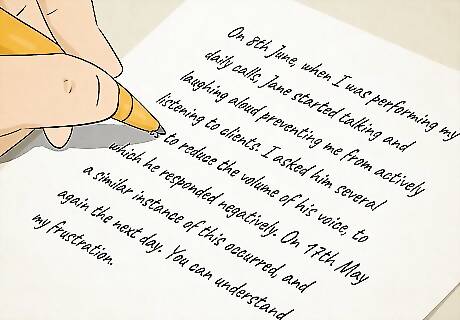
views
Dealing with Social Situations

Stay away from the person. Avoidance is sometimes the easiest way to ignore someone. If someone is getting on your nerves, try to keep your distance as much as you can. You can avoid places they're likely to hang out. If an annoying co-worker always eats lunch at noon, try eating lunch outside of the office or taking a later lunch. Avoid social situations where you're likely to see that person. If annoying person from school is going to be at party this weekend, try making other plans.

Avoid eye contact. When you're in the same room with someone who annoys you, be aware of your eyes. If you accidentally glance at the person, this could result in eye contact. This can be misinterpreted as an invitation to come over and talk. When you're around the person, try not to look at them. This will help minimize interactions.

Communicate through others. If you work with someone, you sometimes have to communicate with them. It may be easiest to do it through others. You don't have to be rude about this. Do not, for example, say within the person's earshot something like, "Could you tell Jeff, who I'm not speaking to, to put his dirty dish in the sink?" You can, however, ask others to deliver information when necessary. For example, you're working in a group for a work project. The annoying person is in your group. You may ask one of your group members to talk to the person, or you might only reach out to them via email or text message.

Curtail your responses. You can't completely avoid talking to someone, especially if you see them at work or school. You don't want to give a complete silent treatment when someone's talking to you, so work on curtailing your responses. When someone talks, give curt responses like "Hmmm" and "Okay." This will hopefully send the message that you want some space.

Tune out negative behavior. If someone is pessimistic or highly critical of things, try to ignore it. Ignoring it may help you stay positive without their negativity affecting you. For example, if your office mate constantly complains about how much work they have, try ignoring them so that you don't feel bad about your own work. You shouldn't ignore everything. If a co-worker always teases you to the point you feel uncomfortable around them, confront them. You can say, "Would you mind not joking about my outfit? I enjoy what I wear, but it makes me feel bad when others criticize how I dress."

Find strengths in numbers, if necessary. If the annoying person is very aggressive towards you, adopt the buddy system. Try to have friends or co-workers accompany you places you're likely to see the person. Friends can, for example, walk with you between classes or eat lunch with you to keep the annoying person away.
Maintaining Good Manners

Be formal with the person. There is no reason to be rude simply because you're ignoring someone. In fact, being rude will only escalate the situation. When you have to talk to the person, do so with formality. Say things like, "Please," "Excuse me," and "Thank you." Show the person basic manners while maintaining a somewhat stiff demeanor. This will show the person you're not being hostile but you don't want a lot of interactions with them.

Do not taunt the person. Ignoring someone should not be an aggressive act. Do not make faces at the person, roll your eyes when they talk, or blatantly pretend not to hear them when they address you. You are now being annoying in return, which is not a good way of dealing. Never taunt someone while you're ignoring them.

Acknowledge their presence when necessary. You cannot completely tune someone out, especially if you work with that person. When necessary, acknowledge their presence in a manner that's polite but not overtly friendly. For example, offer a brief wave or nod when you pass them in the hallway. Reply to their question of, "How are you?" with "I'm fine. Thanks." Whenever you speak to this person, keep your sentences short and to the point. This will prevent any awkward or uncomfortable chatter.

Walk away when necessary. Sometimes, people may not take the hint. If someone continues to annoy you, even when you've tried to subtly indicate you don't want to talk to them, it's okay to make an excuse and walk away. For example, a co-worker is being very critical about an aspect of your personal life. Even though you're giving non-comital responses, they keep at it. Say something like, "Okay, I appreciate the input, but I don't really need it and I have somewhere to be." Then, leave the situation.
Confronting Someone if Necessary

Stand up for yourself in the moment. Sometimes, an annoying person may cross a line to the point you feel uncomfortable or threatened. In these scenarios, it's okay to stand up for yourself in the moment. Be assertive and address the situation. Calmly tell the person they crossed a line. Let them know you do not tolerate this type of behavior. For example, "Don't talk to me like that. I don't need unsolicited advice."

Document negative behaviors at work or school. If you feel uncomfortable because of an annoying person at work or school, document this. You want to make sure you have information to give to a higher authority if it comes to that. Each time the person gets on your case, briefly jot down what was said, who saw it, and the date and time. If you ever need to raise a formal complaint, you'll have a lot of information from which to pull.

Talk to the person about their behavior calmly. If someone is consistently annoying you, it's okay to calmly address the behavior. Wait until you can get a moment alone with the person and calmly and collectively explain what they are doing wrong. For example, "I know you don't mean anything by it, but I don't love getting teased about my outfits." Let the person know how the behavior makes you feel. "It makes me feel uncomfortable at work, because people are always pointing out my looks now." Lastly, tell the person where to go from here. For example, you can say, "I really don't want you to make comments like that anymore. Do you understand?" Instead of criticizing the person, tell them what types of actions you won't tolerate. This will help prevent conflict. Instead of saying, "You're so annoying," you might say, "I really need quiet time to get my work done."

Bring in an outside authority figure. If someone's behavior does not improve after a direct confrontation, call in a higher authority. If you're in school, let a teacher or principal know. If you're at work, talk to someone in the HR department. You have a right to feel comfortable at your place of work or your school.




















Comments
0 comment